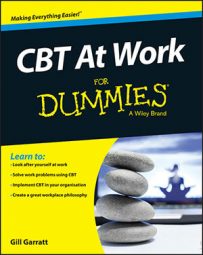Cognitive Behavioural Therapy (CBT) can help you find a greater understanding of how you think and behave. CBT can help you identify what emotions are bubbling up inside you and teach you some practical strategies to help reduce the negative ones that don't serve you well.
How to Determine If You're Depressed
There is a strong possibility that you’re depressed, but you don’t know it. You might feel tired, or just out of sorts more often than you use to. To find out if you might be suffering from depression, here are some signs and symptoms:
-
Insomnia and always tired
-
Changes in eating habits — more or less eating and drinking
-
Feeling ill frequently, many colds and coughs, generally ‘low’ physically
-
Lack of interest in things — hard to be motivated or unable to find pleasure in the world around you, feelings of hopelessness
-
Low mood over a period of time — longer than two weeks
-
Unable to make decisions, struggling to make your mind up over little things as well as big decisions
-
Loss of interest in or unable to participate in sex
-
Forgetful or a poor memory
-
Feeling emotional or ‘wobbly,’ for much of the time.
-
You want to withdraw and be on your own. Excessive sleeping or sleeping less than six hours.
Sleep and Your Mental Health
During sleep, your brain processes your learning and encourages brain cells to make connections with other brain cells. Sleep is one of the most important things you’ll do all day (or night) so always strive to get a good night’s sleep.
-
There are different types of sleep — restorative sleep, healing sleep, and dream sleep
-
During dream sleep, rapid eye movements can be observed REM — this sleep is essential for health cognitive functioning.
-
You sleep in ‘chunks,’ the dream sleep occurs in waves and after falling into a deep sleep, your sleep patterns show lighter sleep.
-
Your depth and quality of sleep can be affected by intake of alcohol. You may fall into a deep sleep quickly but then after about four hours, you tend to wake suddenly and unrefreshed.
-
Sleep deprivation is a major factor in negatively affecting mental health.
-
During sleep, your immune system is boosted and encourages white blood cells to generate, which fight off infections.
-
People sleep in cycles, often thought to be a vestige of ancient behaviours where people would wake every so often to be aware of danger, important to survival.
-
When you are stressed and anxious, you may find it is hard to get off to sleep or you fall asleep, only to wake feeling anxious a couple of hours later.
-
Sleep disturbances are a major indicator of an imbalance in your emotional states.
10 Tips for a Better Work and Home Life
Everyone wants a peaceful, happy work and home life. Some days, however, daily stressors can make that goal hard to achieve. Here are ten tips that can help you find some happy balance.
-
Work out your boundaries — decide if and when you will take work home. Put a time limit on work out of office hours.
-
Plan for your personal life — decide how much time you want to give to your personal relationships and work out your priorities
-
Don’t push your luck when it comes to tolerant partners. Other people have their own limits and boundaries and you may wake up to find they have closed the boundaries.
-
Practise enlightened self-interest — if you don’t look out for you no one else will.
-
Decide if you want to spend most of your time looking down, at emails, social media, constantly searching and researching on the internet, or if you want to build in ‘looking around time’.
-
Lucky people’, are open to experience, take risks and engage personally with high levels of interaction.
-
Rationalise your work patterns. Work more efficiently and try not to be in the habit of constantly working for the sake of it.
-
Remember, you can say no. Use cognitive behavioural therapy (CBT) to give you that breathing space.
-
Being perfect is not essential — it may be preferable to you, but accepting it cannot always be achievable will take the unnecessary pressure off yourself.
-
Very few people die wishing they had stayed longer at work.
10 Cognitive Behavioural Therapy Tips to Remember
When life gets challenging or tricky, you can use the following cognitive behavioural therapy (CBT) 10 tips to help you “get a grip” on life’s challenges.
-
Be on the lookout for any unhealthy negative feelings:
Anger
Anxiety
Guilt
Jealousy
Embarrassment
Shame
Fear
Depression
Low self-worth; lack of confidence
-
Name that feeling C.
-
Look for the situation or trigger that set the feeling off; this could be your internal thoughts.
-
Name the trigger A.
-
Remember, A did not cause C.
-
Work out the B — your belief or your thinking about the trigger.
-
Work out your ‘should,’ ‘ought,’ or ‘must’ thinking.
-
Challenge your own irrational thinking.
-
Change the irrational thinking to more rational thinking — ‘I would prefer that this hadn’t happened, but it has. How is upsetting myself helping me?
-
Make a cognitive shift to accepting the situation or trigger; you don’t have to like it. Accepting the situation will allow you to move forward.

